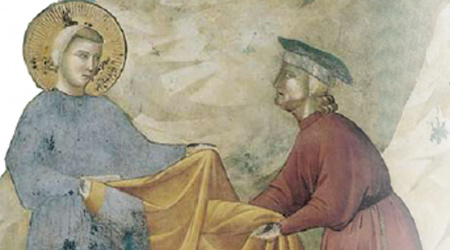Fratelli Tutti, On Fraternity and Social Friendship Encyclical of Pope Francis
Read & download the .pdf version here
In his third encyclical, Fratelli Tutti, On Fraternity and Social Friendship, Pope Francis focuses on many of the issues that serve to fracture our relationships with each other and with society. Released on the eve of the Feast of St. Francis of Assisi, the eight-chapter papal document studies the effects of our social ills and proposes a pathway to human fraternity and social friendship.
The title of the encyclical Fratelli Tutti, or ‘Brothers All,’ sets the tone for the pope’s exhortation to all of us to examine the disunity plaguing our world and to find ways, in kindness, to heal our brokenness. He talks about the illuminating effect of the global pandemic:
As I was writing this letter, the Covid-19 pandemic unexpectedly erupted, exposing our false securities. Aside from the different ways that various countries responded to the crisis, their inability to work together became quite evident. For all our hyper-connectivity, we witnessed a fragmentation that made it more difficult to resolve problems that affect us all. Anyone who thinks that the only lesson to be learned was the need to improve what we were already doing, or to refine existing systems and regulations, is denying reality.
It is my desire that, in this our time, by acknowledging the dignity of each human person, we can contribute to the rebirth of a universal aspiration to fraternity. Fraternity between all men and women. … Let us dream, then, as a single human family, as fellow travelers sharing the same flesh, as children of the same earth which is our common home, each of us bringing the richness of his or her beliefs and convictions, each of us with his or her own voice, brothers and sisters all.
As he has throughout his papacy, Pope Francis focuses on discernment; the encyclical does not provide specific actions to take, but calls on all people to move forward in the light of Christ. He uses the parable of the Good Samaritan as a model for our behavior.
Chapter Highlights
Chapter 1: Dark clouds over a closed world
In the beginning of the encyclical, Pope Francis identifies the dark clouds plaguing our global disunity: the loss of respect for cultural history, limitless consumption, throw-away cultures, stalled expansion of human rights, fear of immigrants, and the superficiality of digital media with all of its negative effects. It is not a complete list of all of the world’s ills, but rather an identification of how focus on the self instead of on community can lead to darkness.
Chapter 2: A stranger on the road
Citing the parable of the Good Samaritan, Pope Francis asks us to reflect on the persona of each character: the victim, the neglecter, the Samaritan. When have we identified with each? How have we contributed to either the care or failure of society?
We are called to put our belief in God into tangible actions to help unite the world, care for the wounded, and overturn oppression, using each new day as an opportunity for new possibilities. He focuses on the positive force of faith: “…believers come to know that God loves every man and woman with infinite love.” (85)
Chapter 3 – Envisaging and engendering an open world
By our innate design, we find life’s true beauty through relationships. The Samaritan models how relationships need to be open to more than those in whom we find kinship. Genuine love seeks the best life for all, including those normally disenfranchised, such as the elderly and disabled. Fraternity is a conscious and careful cultivation of recognizing each person’s dignity and worth, meeting basic needs, and giving everyone the means to achieve personal potential.
Chapter 4- A heart open to the world
Pope Francis focuses on the issue of immigration in this chapter, recognizing cultural diversity as a gift of enrichment to all and acknowledging that countries who provide mutual assistance augment each other. “We need to develop an awareness that nowadays we are either all saved together or no one is saved. Poverty, decadence and suffering in one part of the earth are a silent breeding ground for problems that will end up affecting the entire planet.”
Chapter 5- A better kind of politics
Politics must be about service to the common good with special concern for the vulnerable. Pope Francis expounds on how today’s populism and liberalism have become a source of polarization which negates collective aspirations. “…political systems must keep working to structure society in such a way that everyone has a chance to contribute his or her own talents and efforts.” (162).Employment and economic viability must be accessible to all. Working for social and political order is the soul of social charity and “charity is at the heart of every healthy and open society.” (184)
Chapter 6-Dialogue and friendship in society
Common ground, Pope Francis explains, can only be found through dialogue, and that dialogue cannot be feverish nor manipulative nor can it withhold information. Rather, our dialogue must respect another’s rational view in an effort to grasp the whole truth. This includes interdisciplinary communication in order to have “…a more comprehensive and integral knowledge of reality.” (204)
What is important is to create processes of encounter, processes that build people that can accept differences.” (217)
Chapter 7- Paths of renewed encounter
Peace, built on justice, mercy, and truth, requires collaboration and a legitimate assessment of a situation. “This requires us to place at the center of all political, social and economic activity the human person” (232)understanding “that inequality and lack of integral human development make peace impossible.” (235)
The pope here focuses on the ‘false answers’ of war and the death penalty as means to resolve conflict. They “do no more than introduce new elements of destruction in the fabric of national and global society” (255).While past eras and circumstances may have justified those institutions in some cases, that does not hold today.
Chapter 8-Religions at the service of fraternity in our world
“The different religions, based on their respect for each human person as a creature called to be a child of God, contribute significantly to building fraternity and defending justice in society.” (271)Religions acknowledge transcendent truth, serve as witnesses to God’s guidance, and promote wisdom through reflection on religious traditions. “For us the wellspring of human dignity and fraternity is in the Gospel of Jesus Christ,” (277)who teaches us to see as God does, with our hearts.
Sidebar: What is an encyclical?
An encyclical, from the Greek for circle, is a circular letter – today, it simply means a letter written by a pope to bishops – either the bishops of a particular country, or most often, as in the case of Fratelli Tutti, all the bishops of the world.
Which pope has written the most encyclicals?
In first place is Pope Pius XII with 41. For comparison, Popes John XXIII, Paul VI, John Paul I, John Paul II, Benedict, and Francis combined have written 35.

